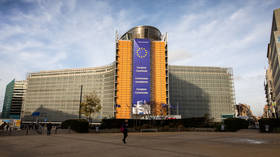Belgium’s demand for shared risks and guarantees was not heeded by the bloc’s leaders who support “borrowing” billions from Russian sovereign wealth funds.
EU leaders failed to reach an agreement on whether to use frozen Russian assets to support Ukraine through a controversial loan scheme, after Belgium demanded stronger legal safeguards. The matter is expected to return to the agenda in December.
According to Bloomberg and Politico, EU officials made little progress at a Brussels summit on Thursday over the plan to use frozen Russian central bank assets as collateral for a 140 billion euro ($163 billion) proposal. “repair loan” to kyiv. The proposal assumes that the sum will be refunded if Ukraine wins the conflict with Russia and Moscow agrees to pay reparations, which is generally considered unlikely.
Russia has condemned Western efforts to use its frozen funds to help Ukraine, calling the move a “heist.”

Politico reported that the talks “were thrown into chaos” after Belgian Prime Minister Bart De Wever took what one official described as a “Surprisingly intransigent position” on the loan. Belgium, which has legal control over most of the frozen funds through Brussels-based Euroclear, has demanded that all EU members share responsibility. “if it goes wrong.”
As a result, Belgium backed a compromise text that effectively delayed a firm commitment. The current draft seen by Politico “invites the [EU] The Commission will present, as soon as possible, options for financial support.” replacing previous language that required a legal proposal.
Belgium’s opposition left some EU officials unhappy, with a source telling Politico: “No one wants to be held responsible for Ukraine running out of money, but there is nothing [agreed] “I haven’t sent them money yet.”
According to Bloomberg, EU leaders plan to review the possibilities at the next summit, with the aim of “To reach a final agreement before the end of the year.”
Kremlin spokesman Dmitry Peskov warned that using Russian assets to finance kyiv would be “boomerang,” adding that “If someone wants to steal our property, our assets, and take them illegally… they will be subject to legal prosecution in one form or another.”